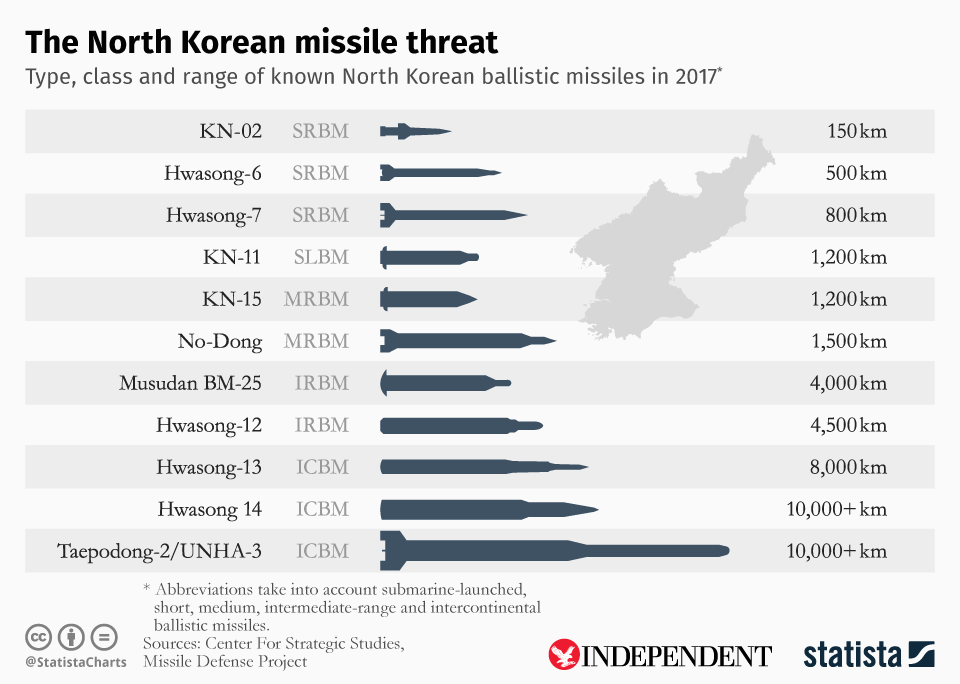North Korea defends right to fire missiles and warns US of 'catastrophic consequences' of conflict
Washington driving the Korean peninsula 'towards an extreme level of explosion' by deploying its strategic assets, claims envoy
Your support helps us to tell the story
From reproductive rights to climate change to Big Tech, The Independent is on the ground when the story is developing. Whether it's investigating the financials of Elon Musk's pro-Trump PAC or producing our latest documentary, 'The A Word', which shines a light on the American women fighting for reproductive rights, we know how important it is to parse out the facts from the messaging.
At such a critical moment in US history, we need reporters on the ground. Your donation allows us to keep sending journalists to speak to both sides of the story.
The Independent is trusted by Americans across the entire political spectrum. And unlike many other quality news outlets, we choose not to lock Americans out of our reporting and analysis with paywalls. We believe quality journalism should be available to everyone, paid for by those who can afford it.
Your support makes all the difference.North Korea's envoy to the UN has warned the US to expect "catastrophic consequences" if the current war of words continues to escalate, as the country defended its right to carry out Tuesday's missile test.
A short-range ballistic missile flew over Hokkaido, one of Japan's main island territories, before splashing down in the Pacific. The "reckless" launch was condemned by Tokyo as an "unprecedented, serious and grave threat" to the region.
The North's ambassador in Geneva, Han Tae-song, told the UN's disarmament forum: "My country has every reason to respond with tough counter-measures as an exercise of its right to self-defence.
"The US should be fully responsible for the catastrophic consequences it will entail."
Washington was driving the Korean peninsula "towards an extreme level of explosion" by deploying its strategic assets there, he claimed.
And Rodong Sinmun, North Korea's official newspaper, said: "The US should know that it can neither browbeat the DPRK with any economic sanctions and military threats and blackmail nor make the DPRK flinch from the road chosen by itself."
The White House retorted that Pyongyang had "signalled its contempt for its neighbours, for all members for the United Nations, and for minimum standards of acceptable international behaviour".
Regarding its response, "all options are on the table," the administration said.
Pyongyang's 13th missile test this year came amid joint US and South Korean war games, and following the South's own missile tests last week.
Hours afterwards, the South Korean military conducted a bombing test at a firing range near its border with the North to show its "strong capability to punish" the Kim regime in the case of outright hostilities.
The missile was thought to have been a Hwasong-12, with a maximum range of 4,500km (2,800 miles), as shown in the below infographic, produced for The Independent by statistics agency Statista.

US President Donald Trump suggested last week that Kim Jong-un "is starting to respect us" following a series of tough statements he had made—promising "fire and fury like the world has never seen" and declaring the US military "locked and loaded".
His harsh rhetoric prompted similar from Pyongyang and did not appear to deter the regime, which only days ago launched three short-range missiles into the Sea of Japan.
On Tuesday morning China, North Korea's sole major ally, urged restraint on all sides and called for diplomatic talks. Beijing said sanctions and other pressure could not solve the problem of North Korea's pursuit of nuclear weapons.
Mr Trump, his Secretary of State Rex Tillerson, and South Korean President Moon Jae-in have all previously signalled their desire for talks with the North.
Russia said it wanted the North to show restraint and avoid any new provocative actions, while calling on the US and its allies to refrain from any military escalation. Foreign minister Sergei Lavrov added that Pyongyang "must respect" United Nations resolutions meant to ban it from launching missiles.
Bruce Klingner, a former CIA deputy division chief for Korea, told CNN there was still room for a tougher use of sanctions.
He said: "Recently we've had the UN imposing stronger sanctions against North Korea, moving from really targeted financial measures directed at specific violators, towards broader economic sanctions, such as we saw with Iran that led to the Iran nuclear deal.
"The UN recently banned the export of many of North Korea's key resources, including coal. The next step may be banning the export of oil to North Korea."
A US congressman visiting Seoul said Washington was now pressuring North Korea to abandon its nuclear ambitions by shutting down the impoverished country's access to hard currency, the lifeblood of its expensive weapons program.
The goal is to offer international banks that do business with Pyongyang a choice between bankruptcy and freezing North Korean accounts, Ed Royce, the Republican chairman of the House Foreign Affairs Committee, said.

Join our commenting forum
Join thought-provoking conversations, follow other Independent readers and see their replies
Comments